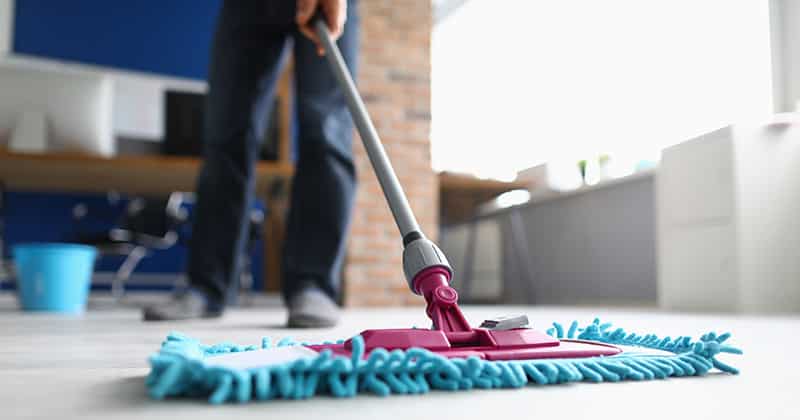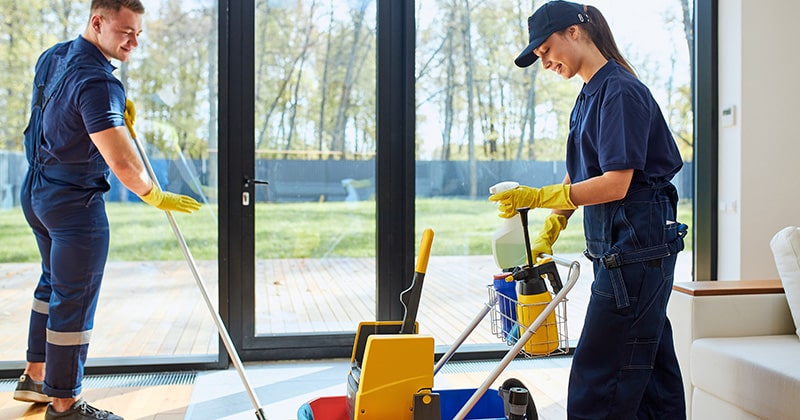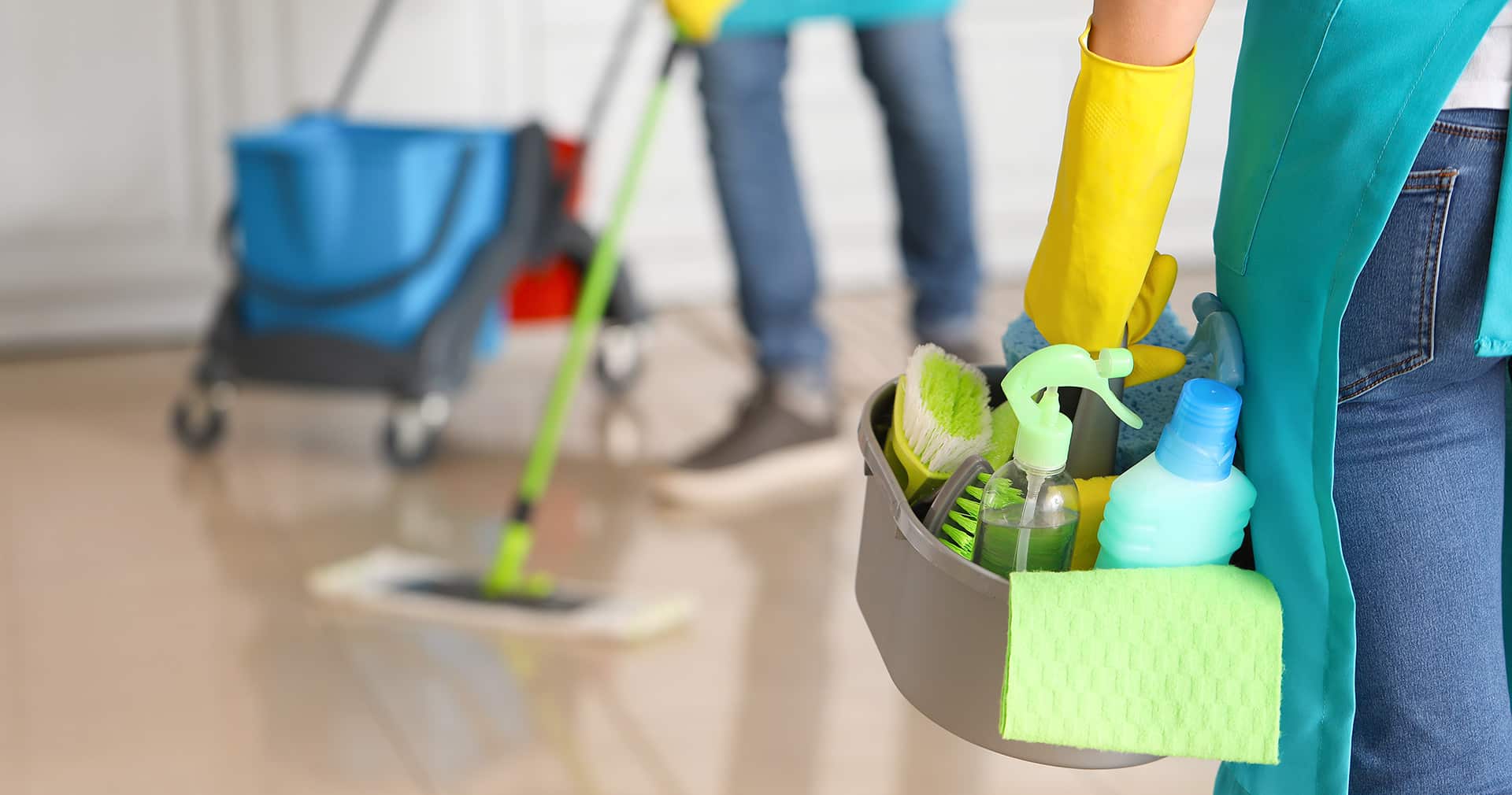Do You Need Insurance to Start a Cleaning Business?
No matter the type of cleaning business you’re launching—commercial or residential—you should have business insurance. But don’t stress. Getting the right policy doesn’t have to be overwhelming.

Managing Editor
Starting a cleaning business is a lot of work. Your to-do list is probably already a mile long. It might well be tempting to cut a few corners to save yourself some time.
But should you cut corners when it comes to insurance for your cleaning business?
No matter the type of cleaning business you’re launching—commercial or residential—you should have business insurance. But don’t stress. Getting the right policy doesn’t have to be overwhelming.
In this article, we’ll cover the basics you should know about cleaning business insurance. We’ll explore why you need it. We’ll also address how much it costs. And finally, we’ll provide some direction on how you can get the best rates for your business.
Let’s do this.
What Is Business Insurance?

Business insurance provides coverage for businesses against potential losses or damages.
Business insurance typically covers unforeseen events like:
- Property damage
- Personal damage
- Lawsuits
- Accidents
Business insurance also helps cover costs associated with medical bills and liability claims. Ultimately, it provides peace of mind, even if (and especially when) something unfortunate happens.
Why You Need Insurance for Your Cleaning Business
Insurance is like a bet you place against yourself. That’s the adage, anyway. And to a degree, that’s true—until you need insurance.
Why do you need business insurance? You need business insurance to protect your business and your personal finances. When the unexpected happens, insurance minimizes your potential loss.
Without insurance, you’re at risk. Every time you go to a client site to provide cleaning services, there’s a chance something could go wrong. Even if you and your staff are cautious and responsible, the possibility of personal harm or property damage is always in play.
While insurance is an expense, the cost of just one significant mishap could threaten the profitability of your whole business. Why take that chance?
Plus, depending on where you live, state laws might require you to have certain types of insurance. You certainly don’t want to incur the unnecessary expenses that come with non-compliance.
What Types of Insurance Are Required for a Cleaning Business?

Depending on what state you’re in, you might be required by law to have certain types of insurance. And regardless of location, you’ll need commercial auto insurance if your cleaning business owns a vehicle.
If you’re wondering what specific coverage you’re required to have in your state, that’s an excellent question. We recommend that you use an online tool (like this one) to research your state’s requirements.
But even if you aren’t required to have specific types of insurance to open a cleaning business, that doesn’t mean you should go without. As we mentioned above, insurance is protection.
Sure, you can save a few bucks in the short term by going without. But there’s a lot on the line. Are you really willing to roll those dice?
Here are some of the types of insurance you may want to consider for your cleaning business.
Workers’ Compensation Insurance
Workers’ compensation insurance provides financial and medical benefits to employees who have been injured or become ill due to their work.
This type of insurance typically compensates workers for the following:
- Lost wages
- Medical expenses
- Other costs associated with workplace accidents and injuries.
And here’s why you should provide it as an employer. Workers’ comp insurance helps protect you from liability claims brought by employees for workplace injuries or illnesses.
If you’re the only employee, you might not need workers’ compensation. But if you have employees, you should consider it regardless of whether or not you’re required to have it.
General Liability Insurance
General liability covers property damage or bodily injury claims made against your company. It covers claims made by clients, vendors, and other third parties.
It also protects your business from financial losses caused by libel, slander, and lawsuits.
This might be the most important type of business insurance for your company.
If you’re just starting your business, you can start with general liability and workers’ comp. (Assuming you’re not required to carry other types of coverage.) Then you can add more insurance later as your business grows.
Also, if you have a commercial lease, you’ll likely be required to have general liability insurance.
Fidelity Bonds
Fidelity bonds provide protection to employers against dishonest actions taken by an employee.
The bond pays a benefit when an employee is found guilty of theft, fraud, or other unlawful acts relating to their employment. Fidelity Bonds also provide coverage for losses incurred due to errors or omissions made by an employee in their job duties.
This type of insurance is extremely important in an industry like the cleaning industry. It helps protect you even if you happen to hire someone dishonest or negligent.
Commercial Property Insurance
What about property damage your cleaning services company incurs? To protect your property—a physical office, cleaning supplies, and equipment—you’ll need a commercial property insurance policy.
This type of insurance protects your assets after a covered event, such as certain natural disasters, fire and smoke, or burglary.
When you’re just starting out, you might not own a lot of high-value assets. But as you acquire more, keep this form of insurance in mind. When you eventually open an office, purchase a fleet of vehicles, and invest in high-dollar equipment, you’ll want commercial property insurance.
Commercial Auto Insurance
Commercial auto insurance protects your business’s vehicles.
For example, if your cleaning business has a work van or truck to transport your employees and cleaning supplies, you’ll need a commercial auto policy. You might also need this type of insurance if your employees drive to your clients’ sites.
Business Interruption Insurance
How long will your cleaning business survive if you have to stop operations for a bit? Events like fire or a natural disaster can bring business to a screeching halt.
With business interruption insurance, you’re covered for things like lost wages, lost revenue, and bills.
Covered events generally include wind, lightning, fire, and theft. You may also be able to bundle this type of insurance with your general liability policy.
How Much Does Insurance Cost?

Business insurance will add to your expenses, which can make it difficult when you’re just starting out. But the good news is it’s often tax deductible.
Paying for insurance also saves you a lot in the long run if something unexpected happens. That’s why so many business owners consider it a worthwhile investment.
So, how much does business insurance cost?
On average, cleaning and janitorial businesses pay about $45 per month for general liability. You can also get a business owner’s policy that combines general liability coverage and commercial property insurance for about the same amount.
The median price for fidelity bonds is $88 per month. That will give you about $1 million of coverage.
While that will cut into your initial profits, a total cost of under $150 per month should be manageable for most startups.
What Are the Benefits of Having Insurance for Your Cleaning Business?
There’s no question about it. Business insurance comes with some significant benefits.
Consider the following.
Competitive Advantage
Having insurance gives your cleaning business an edge.
Clients are more likely to choose a cleaning service that’s insured and bonded. It means they don’t have to worry about losses due to property damage or theft.
This is super important for a new business. It means you can give potential clients additional assurance. There will undoubtedly be times when that assurance gives your cleaning services a shot at going head-to-head with more established competition.
More Attractive to Employees
You’ll also have an easier time attracting reliable employees.
A good workers’ compensation policy, for example, protects your staff. They know they’ll be protected if anything happens on the job.
Even if you aren’t required to have insurance, you can show your staff you care about their welfare by securing business insurance.
Peace of Mind
Another benefit is knowing the company that you’re working so hard to build is protected.
Accidents happen. And the more clients and employees you have, the more likely an unexpected event will occur. Just one incident could cost your company thousands of dollars in losses or more.
But business insurance is your protection.
How Can You Get the Best Rates on Insurance for Your Cleaning Business?

As covered above, business insurance doesn’t have to break your budget. In fact, you can get all the risk mitigation you need for an affordable monthly rate.
Here are some of the ways you can save.
Bundle Policies When Possible
For example, when you get your general liability policy, see if you can add commercial property and business interruption.
Bundled insurance packages are generally cheaper than individual policies.
Only Get What You Need
If you don’t have high-value assets, you may not need a hefty commercial property policy. Likewise, you might not need a huge fidelity bond if other local cleaning companies don’t carry that kind of coverage.
If you aren’t sure what to get, talk to an insurance agent about what makes sense for your business. You can always add more coverage later.
Compare Insurance Companies
Often, you can save money by shopping around. You certainly shouldn’t buy the first policy you price without researching other options.
Find out how much it will cost to get the business insurance package you want for your business from different providers. While cost shouldn’t be the deciding factor, it should be a factor.
Review Your Policies Once a Year
An annual review is a good time to assess some things about your current insurance company. Are they charging too much? Is the coverage too limited? Is the customer service up to par?
If you’re not happy with your current provider, your annual review is a perfect time to shop around again.
Getting Business Insurance: First Steps
If you’re sold on the idea of insurance for your cleaning business and you’re ready to start the process right now, here’s what you can do today to get the ball rolling.
- See what business insurance, if any, you’re required to carry. You can use this convenient, free tool to do the legwork for you.
- Take stock of your initial assets. Do you have a work vehicle? How much have you invested in equipment? When you know what you’d be protecting, it’s easier to decide if insurance is warranted.
- Conduct a little competitive analysis. Browse some of your competition’s websites. Do you they mention being bonded? If so, potential customers in your area may expect that.
- Review your business plan. You may already have room in your initial budget for minimal coverage. If you do, that can make this decision easy.
Ashley’s professional experience includes content creation of all kinds, from articles and infographics to websites and whitepapers. When she’s not working, she enjoys dark coffee, dad jokes, and fiction—mostly horror and urban fantasy.


